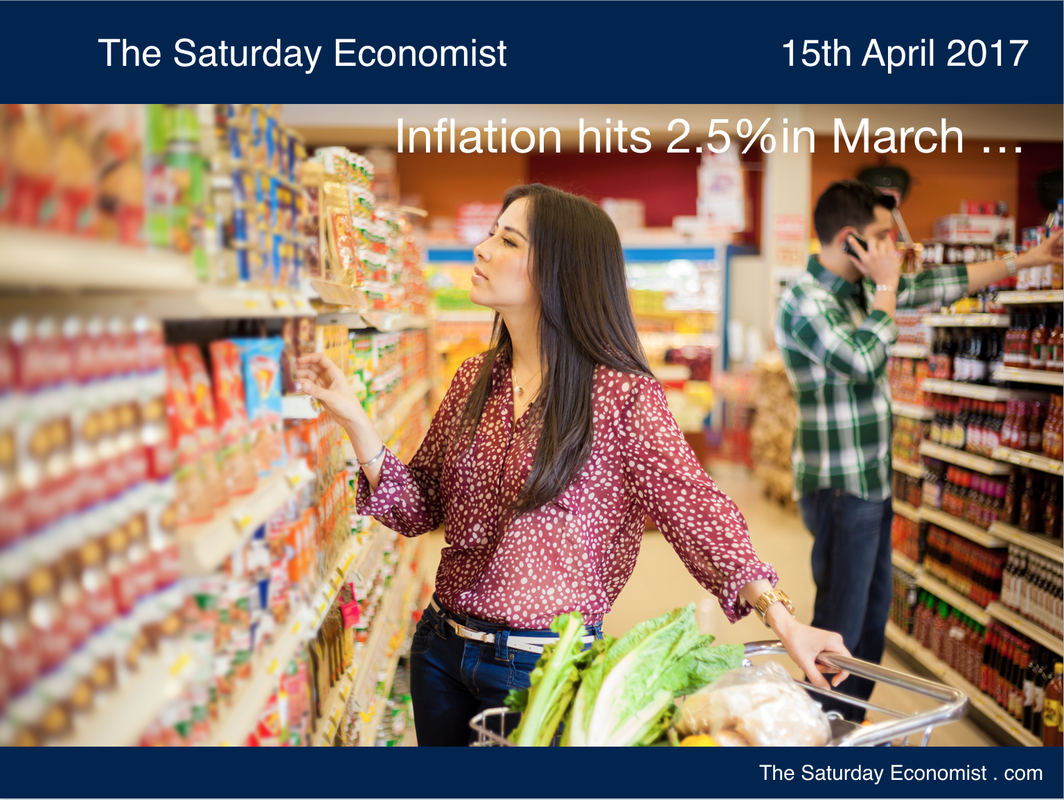 Goods inflation jumped to 2.5% in March up from 1.9% prior month. The headline rate of inflation CPI held at 2.3% due to a surprise drop in service sector inflation. Service sector inflation fell from 2.8% in February to 2.1%. It's hard to see why. A 23% drop in air travel costs assisted the fall but doesn't explain the overall drop. Had service sector inflation held at 2.8%, the overall inflation rate would have been 2.6%. That's well above the Bank of England target. We expect a bounce back in prices in the next couple of months towards our 3% forecast. Producer output prices increased by 3.6% in March and input costs eased slightly to 17.9% from 19.4% in February. The inflationary combination of rising oil prices and the fall in Sterling is beginning to ease as the first quarter 2016 lows in Brent Crude Oil work out of the year on year comparison. The Bank of England remains relaxed about the rise in inflation. The expected acceleration in earnings is not evident in the latest data for February. More economic news this week ... Earnings in the three months to February increased by just 2.3% according to the latest ONS data. The real level of earnings reduced to zero as CPI inflation hit the same level. Should we worry about household spending in the second half of the year? Maybe! Household incomes may be squeezed if inflation continues to rise but then again earnings may rise to offset the price increases. Worth pointing out perhaps retail sales values increased by 6.4% in the same month. No sign of a spending or activity slow down just yet. Last week our headline "Strong growth continues into the first quarter caused a few comments. Asked to commit to a number for growth, we expect growth to be between 2.3% and 2.5% in the first quarter. Inset is our estimate of GDP(O). It is not rocket science, more simple arithmetic. Assuming no radical revisions to the ONS data already released, output is likely to have increased by 2.5% in the first three months of the year. Unemployment fell to 1,559 thousand in February down from 1,584 prior month. It is at the lowest level since Q3 2005 when inflation was 2.8% and base rate was 4.5%. The unemployment rate in February was unchanged at 4.7%, the number of vacancies increased to 767,000. At peak in February 2008 and immediately before recession, the level was just below 700,000. Recruitment difficulties are increasing, the pressure for pay increases is rising, the tide is set to turn in the earnings market. Growth 2.5%, inflation 2.5%, unemployment falling, vacancies at a record high, now is the time to begin the process or rate normalization. The absurd process of corporate bond purchases should be abandoned. The market is thin, the products heterogeneous, do we really believe Apple and IBM need assistance to reduce the cost of borrowing? In the US Trump may place some pressure on Janet Yellen to avoid further rate hikes. The weak jobs growth in March may assist. Inflation is muted, retail sales growth is slowing, forecasters are trimming US growth expectations for 2017. Markets still expect two more rate rises this year. In the U.K. the Bank should act to cap the spread against the green back ... Don't Miss The West Wing, Whisky, Tango, Foxtrot this week ... You can check out the series of blog posts here So what happened to Markets? The Dollar slipped on the Trump call. The Dow closed at 20,453 from 20,711. The FTSE closed at 7,327 from 7,349. Sterling was up against the Dollar to $1.253 from $1.238 and was up against the Euro to €1.179 from €1.1168. The Euro moved up against the Dollar to 1.062 from 1.059. Oil Price Brent Crude closed at $55.64 from $55.19 The average price in April last year was $41.58. UK Gilts - yields moved down. UK Ten year gilt yields closed at 1.05 from 1.07. US Treasury yields moved down to 2.23 from 2.32. Gold closed up at $1,286 from $1,255. John That's all for this week. Don't miss our economics update at PwC Manchester on the 18th May. © 2017 John Ashcroft, Economics, Strategy and Social Media, experience worth sharing. ______________________________________________________________________________________________________________ The material is based upon information which we consider to be reliable but we do not represent that it is accurate or complete and it should not be relied upon as such. We accept no liability for errors, or omissions of opinion or fact. In particular, no reliance should be placed on the comments on trends in financial markets. The receipt of this email should not be construed as the giving of advice relating to finance or investment.. ______________________________________________________________________________________________________________________________ For details of our Privacy Policy and our Terms and Conditions check out our main web site. John Ashcroft and Company.com _______________________________________________________________________________________________________________ Copyright © 2017 The Saturday Economist, All rights reserved. You are receiving this email as a member of the Saturday Economist Mailing List. You may have joined the list from Linkedin, Facebook Google+ or one of the related web sites. Our mailing address is: The Saturday Economist, Tower 12, Spinningfields, Manchester, M3 3BZ, United Kingdom.
0 Comments
Leave a Reply. |
The Saturday EconomistAuthorJohn Ashcroft publishes the Saturday Economist. Join the mailing list for updates on the UK and World Economy. Archives
July 2024
Categories
All
|
| The Saturday Economist |
The material is based upon information which we consider to be reliable but we do not represent that it is accurate or complete and it should not be relied upon as such. We accept no liability for errors, or omissions of opinion or fact. In particular, no reliance should be placed on the comments on trends in financial markets. The presentation should not be construed as the giving of investment advice.
|
The Saturday Economist, weekly updates on the UK economy.
Sign Up Now! Stay Up To Date! | Privacy Policy | Terms and Conditions | |

 RSS Feed
RSS Feed